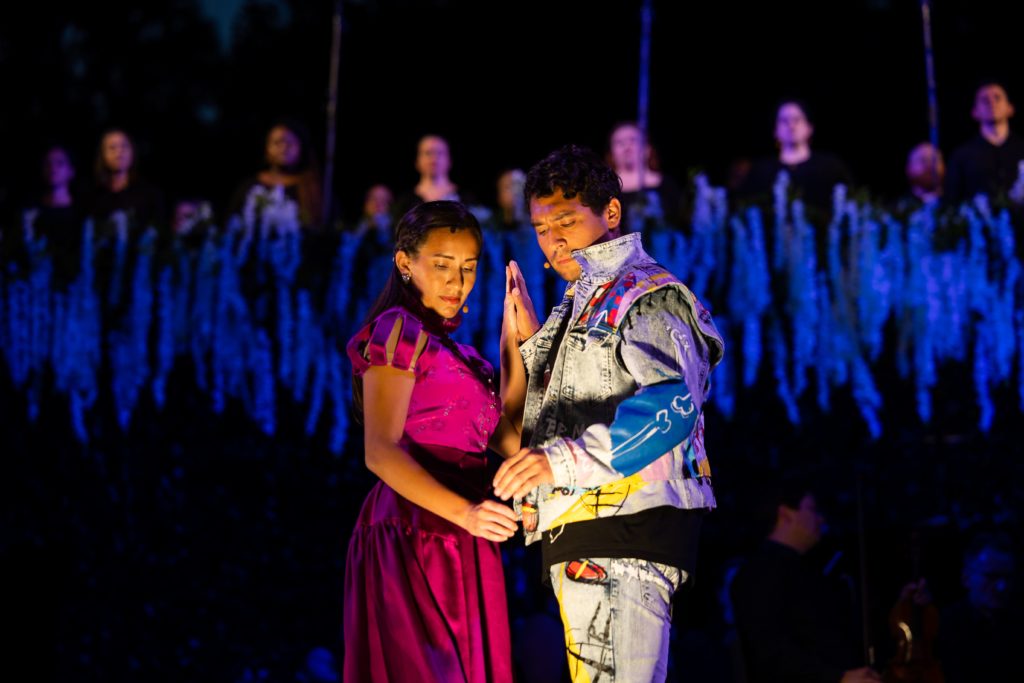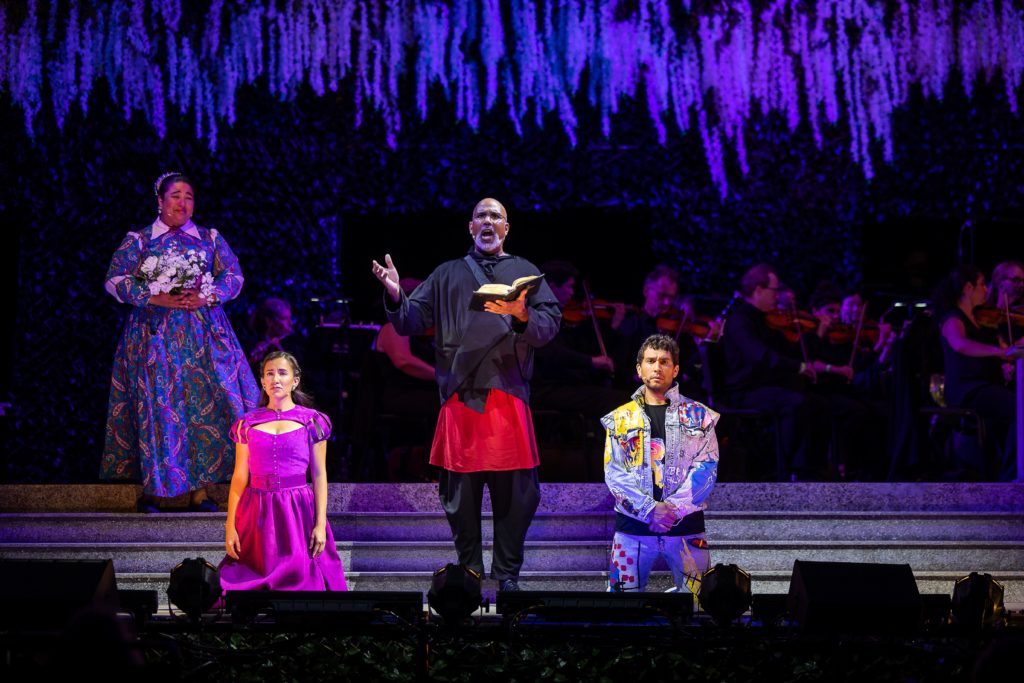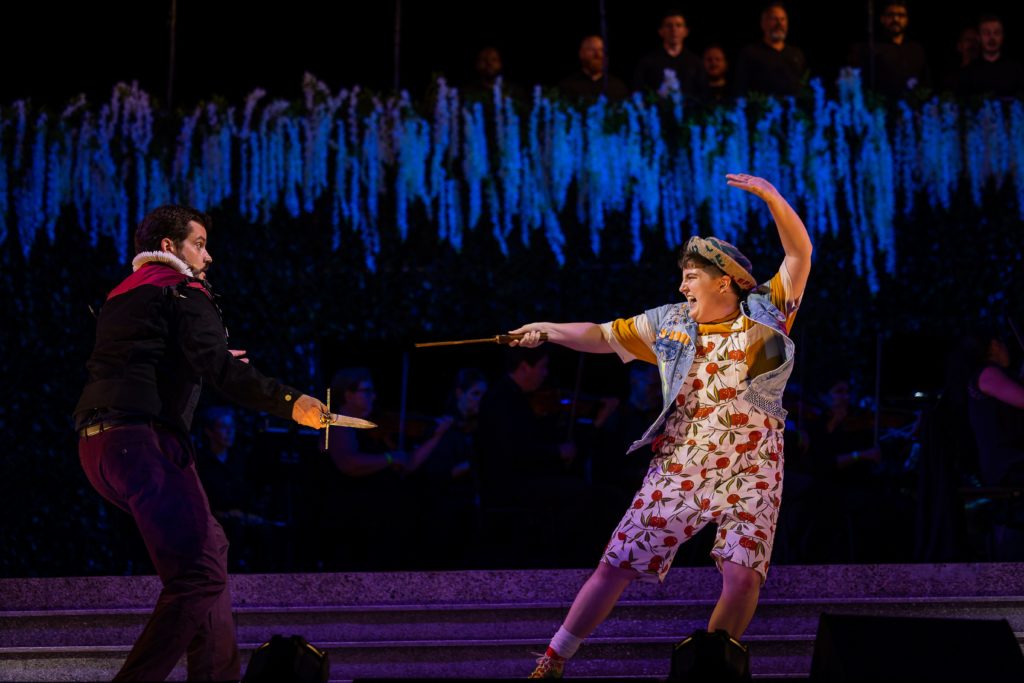
L-R VANESSA BECERRA AND RICARDO GARCIA AS THE TITLE CHARACTERS IN BLO’S PRODUCTION OF ROMEO & JULIET.
Photo by Nile Scott.
Presented by Boston Lyric Opera
In partnership with Commonwealth Shakespeare Company
Music by Charles Gounod
Libretto by Jules Barbier & Michel Carré, after William Shakespeare
English text by Edmund Tracy
Performance edition by David Angus, Steven Maler and John Conklin
Conducted by David Angus
Directed by Steven Maler
Dramaturgy by John Conklin
Choreography by Victoria L. Awkward
Fight direction by Nile Hawver
The Playbill
For Accessibility Information and Questions, BLO Audience Services can be reached at 617.542.6772 or boxoffice@blo.org.
FREE on the Boston Common
Thursday, August 11, 2022 at 8PM
Saturday, August 13, 2022 at 8PM
Performed on the Commonwealth Shakespeare Company stage
139 Tremont Street
Boston, MA 02111
Total run time, including one intermission, is two hours.
Sung in English with English supertitles.
Critique by Kitty Drexel
BOSTON, Mass. — BLO’s Romeo & Juliet remixes the French opera by Gounod and Barbier & Carré with the original Shakespeare play of the same name. The BLO production is successful as an opera for the masses and as fan art of the original. Diehard opera fans may find fault in this original production, but the open-minded will find a lot to love.
Dwellers who live ‘neath the rocks can find the Rome & Juliet synopsis here: https://blo.org/romeo-juliet/. To sum up, Romeo and Juliet are two crazy kids who fall in love at a party. Then, because they snog instead of talking, they die. Love is hard.
Boston Lyric Opera reduces the five-act opera to a merciful two. Score editors David Angus, Steven Maler, and John Conklin added two speaking actors (Ed Hoopman and Cheryl D. Singleton who were fantastic.) to the usual vocalists and supernumeraries to Gounod’s opera who read expositional text from Shakespeare’s play. The result is an opera/play hybrid that works: we still hear famous music from the opera that showcases the vocalists’ talents; the play hits all the important plot points (and deaths) and avoids a extra-lengthy visit to the Common.
Opera snobs may be disappointed in the cuts to Gounod’s baby. Theatre snobs may feel vindicated that the opera finally includes Shakespeare’s language. Everyone else should be pleased with the compromises made to combine both works.
There was some great singing on Thursday night. It takes great stamina and insight to successfully navigate an outdoor performance during an ongoing pandemic peppered with unparalleled heatwaves. The singing and acting casts gave commendable performances despite the challenges created by the Common’s human and other residents.
The ensemble sang from the stage’s trellis, above the orchestra. Its diction was very good. Music director Angus’ conducting cues were very clear.

PHILIP LIMA (C) AS FRIAR LAURENT MARRIES JULIET (VANESSA BECERRA, L.) AND ROMEO (RICARDO GARCIA, R.) WHILE GERTRUDE (ARIELLE ROGERS) LOOKS ON IN THE BLO PRODUCTION OF ROMEO & JULIET. Photo by Nile Scott.
Vanessa Becerra performance of Juliet was exceptional. She made the hundreds of years old role of Juliet sound like she never lived until her birth on the stage that night. Her interpretation of “Je veux vivre” floated like a dream over the orchestra. It’s an aria that every soprano cuts their teeth on in undergrad. I’d heard it so many times in my twenties that I felt hopeful I’d never hear it again. The “Poison Aria” was also a hit.
Ricardo Garcia’s hits were big hits. His misses were minor but not unfortunate.
Garcia needs to cheat out when he’s not singing to the audience from center stage. He has an unfortunate habit of bending his knees before a difficult passage or high note. He straightens his knees as he sings the passage or hits the note. This is a trick to engage the ab and back muscles to support one’s singing.
When the staging didn’t allow Garcia to bend his knees before such a passage, he fumbled. When the staging did allow him to bend his knees, he sounded glorious. When he sang “Go Now and Slumber” to Juliet, I wanted to swoon from how romantic and gushingly croony he sounded.
The breakaway stars from Thursday’s performance were Mack Wolz and Arielle Rogers-Wilkey as Nurse Gertrude. Wolz had great timing as the young buffoon Stephano. They brandished a wooden dagger with comedic flair and sang the “Turtledove Aria” to an eager audience. It was a fine diversion from the impending tragedy and a highlight of the night.
Rogers-Wilkey as Gertrude was wasted in this production. She sang a bit of Bizet’s “Habanera” at the top of the show but otherwise had no notable solos. It’s unfortunate that something wasn’t added in because the snippet of “Habanera” was electric. The good news is that Rogers-Wilkey will be performing in BLO’s upcoming productions of La bohème and Omar.
The fight choreography looked insecure. Insecure actors performing uncertain fight choreography are dangerous. Stage rapiers aren’t real weapons, of course, but they can still hurt someone. They require more training than a few hours of rehearsals. Actors who aren’t prepared to confidently perform with stage weapons in a manner that looks realistic and safe to an audience should not perform with stage weapons. This cast was not prepared to use them.
Stage combat workshops are held in the Boston-area. Every performer should seek them out and take at least one. Ask your local fight choreographer for more info.

TEPHANO (MACK WOLZ, R.) TAUNTS GREGORIO (DAVID MCFERRIN) IN THE BOSTON LYRIC OPERA PRODUCTION OF ROMEO & JULIET.
Photo by Nile Scott.
At the end of the opera, Romeo entered Juliet’s tomb with a naked dagger in his belt loop. Garcia didn’t have a sheath or a belt to hold the dagger in place. He had to hold it in place with his hands. Garcia had to absently hold a dagger to his person while he sang. It looked to the audience like he was in danger to hurting himself.
In one moment, Garcia lost control of the dagger because he was very busy singing and the dagger fell to the stage. Apart from dragging the audience out of the performance, this mishap indicates that the chain of command in charge of giving Garcia the dagger was okay with letting Garcia look unprofessional on stage and also letting the audience think Garcia could get hurt. Garcia didn’t make a mistake. BLO made a mistake in forcing Garcia to perform this way.
Meanwhile, the costuming by Nancy Leary was the epitome of punk and poise. Its word scrawl elements were reminiscent of Jean-Michel Basquiat. The neon tutus and glitter trainers looked like they came off of a Betsey Johnson runway. It’s what everyone will be wearing this season.
If you missed Romeo & Juliet, that’s too bad. It was a marvelous time when everything came together. Far Out Ice Cream even offered a Romeo & Juliet-inspired flavor called Where FAR OUT thou, Romeo in the New Zealand-style. It had a pleasant, gritty texture like Taza Chocolate bars. It reminded me a little of Cambridge’s own BerryLine.
A helpful scene from Reefer Madness that may shed some light on “Romeo & Juliet.”
